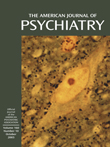Neural Correlates of Episodic Encoding and Recognition of Words in Unmedicated Patients During an Acute Episode of Schizophrenia: A Functional MRI Study
Abstract
OBJECTIVE: Memory impairment has been well documented in schizophrenia. In a previous study, the authors investigated patterns of brain activity during episodic encoding and recognition of words in remitted, stable schizophrenia outpatients being treated with novel antipsychotics. The same procedure was used in this study to investigate unmedicated patients during an acute episode of schizophrenia. METHOD: Functional magnetic resonance imaging was used to study regional brain activation in 10 unmedicated patients experiencing an acute episode of schizophrenia and 10 healthy comparison subjects during performance of a modified version of the words subtest of Warrington’s Recognition Memory Test. RESULTS: Despite intact recognition performance, patients with schizophrenia showed reduced activation of anterior prefrontal, posterior cingulate, and retrosplenial areas relative to comparison subjects during word encoding. During word recognition, reduced activation was found in the patients’ dorsolateral prefrontal and limbic/paralimbic regions. On the other hand, higher metabolism in bilateral anterior prefrontal cortices was observed. CONCLUSIONS: The results suggest that different neural pathways are engaged during episodic encoding and recognition of words in patients experiencing an acute episode of schizophrenia relative to healthy comparison subjects. Furthermore, acute psychosis may prevent practice effects, reflected in a failure to engage brain regions associated with successful episodic memory retrieval in healthy subjects.



